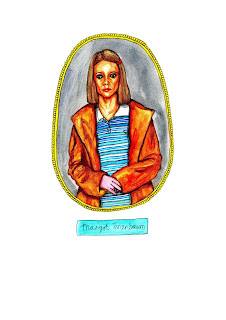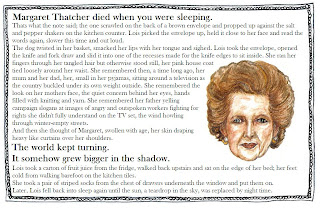She had
already put the clock into her bedside drawer and the ticking she heard now must
be imaginary. She wasn’t even sure she could hear it anymore, each tick and
tock like the sawing of a knife in her side.
Tick. In.
Tock. Out.
She grabbed
at her stomach and with a flat hand pushed against her ribs. The pain seeped up
through her chest and into her throat. She coughed and swallowed forcing the
lump back down towards her middle and it grew and spread until her whole body
was filled with a hurt as heavy as granite. Each breath she took was laboured,
her lungs grabbing gravely at the air, heady with grief.
Tick. In.
Tock. Out.
Her mind
crept over to him. To the way his voice said her name on their wedding day and to
how he drank his coffee in the morning (with his buttered toast and one boiled
egg), and to their children and to their faces when they knew; their small,
round faces.
“Now I have no
one to play with” Little John had said, a sadness in his voice that didn’t
correspond to the news.
She looked
at the pillow next to her and tried to picture him there; tried to imagine his
weight on their mattress, the smell of the day on his skin. And then she saw
Lyndon at her side, his right hand in the air, his left on the bible. She heard
his promise of allegiance as an echo in her ear, as an echo in her ear, as an
echo. She was floating. She was swimming. She was perfectly still. He was lost.
It was over. Jack had gone.
She rubbed
the spot where her wedding ring had been and imagined the friction scorching a ruby
red circle on Jacks little finger. She fixed
her eyes on the gold lampshade above her bed and forced herself not to blink
until the stinging became one long buzz in her eyelids. She wanted to stay here,
to stay disappeared in this room which they had shared. She was in love and she
had been in love and with her eyes still open she willed the night to stop
where it was. The silver grey of the sky lit up the corner of her dressing
table and her pink hat lie upon it like a sleeping dog next to a tube of
lipstick and a hairbrush. The country had needed a hero, her grief had been
their grief; her lose, the world’s. But she was alone. She made a noise that
sounded like crying and which filled the room as though a pipe had burst, then closed
her eyes and let her head fall sideways onto her pillow. She must sleep. She
must get up tomorrow and run a bath and brush her teeth. She must choose a
dress and strings of pearls and wear stockings and shoes with buckles across
her toes. She must continue.
Tonight,
inside a half empty bed, under a night blacker than most others, beneath
crumpled blue sheets she had chosen for them both, she found it difficult to
remember entirely the reason why.
The
tick-tocking began again.
Everything
was starting over.


































